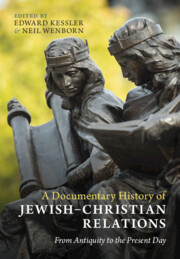Refine search
Actions for selected content:
4 results
Introduction
- from Part I - Historical Context
-
-
- Book:
- The Origins of Scholasticism
- Published online:
- 18 November 2025
- Print publication:
- 31 December 2025, pp 3-21
-
- Chapter
- Export citation
4 - The Medieval Period
- from Part II - 900 to 1800
-
-
- Book:
- A Documentary History of Jewish–Christian Relations
- Published online:
- 03 October 2024
- Print publication:
- 17 October 2024, pp 185-232
-
- Chapter
- Export citation

A Documentary History of Jewish–Christian Relations
- From Antiquity to the Present Day
-
- Published online:
- 03 October 2024
- Print publication:
- 17 October 2024
18 - The Syro-Palestinian Wisdom of the Late Bronze Age
- from Part III - Wisdom Literature beyond the Hebrew Bible
-
-
- Book:
- The Cambridge Companion to Biblical Wisdom Literature
- Published online:
- 28 July 2022
- Print publication:
- 09 June 2022, pp 344-365
-
- Chapter
- Export citation
